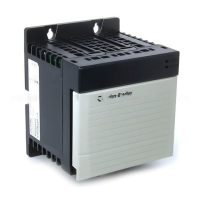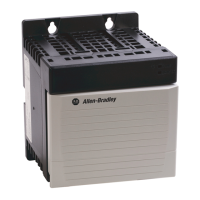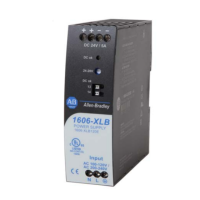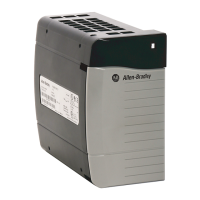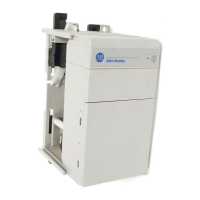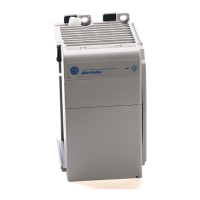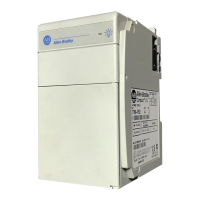Do you have a question about the Allen-Bradley 8720MC-RPS065 and is the answer not in the manual?
Details changes and differences between series # and series B units.
Provides overview of the RPS and its accessories for DC-bus power.
Illustrates DC-bus regenerative power and full-line power configurations.
Explains catalog numbers for RPS units and accessory options.
Guidelines for designing enclosures and planning panel layouts for RPS unit installation.
Details on selecting appropriate circuit breakers or fuses for AC input and DC-bus protection.
Information on selecting magnetic contactors and relays for noise prevention.
Specifies required clearances around the RPS unit for proper ventilation and operation.
Outlines best practices for minimizing noise-related failures in system installations.
Explains bonding as connecting metal parts to reduce EMI effects.
Details creating a common low impedance exit path for high frequency energy in cabinets.
Guidelines for mounting RPS units in parallel configurations, including spacing.
Step-by-step procedure for mounting the RPS units to the system panel.
Illustrations to identify terminal blocks and features of the 8720MC-RPS units.
Block diagrams illustrating mains and control power connections for RPS065 and RPS190 units.
Details terminal block pinouts for mains and control power connections for RPS065 and RPS190 units.
Identifies main features and components of the regulator board, present on leader units.
Provides information on each terminal of the TB3 Sequence Signal Terminal Block.
Contains basic wiring information for RPS units and accessories.
Details how RPS units operate in grounded WYE environments.
Explains the importance of grounding all components for shock protection and damage prevention.
Specifies wire types, sizes, and torque values for RPS065 and RPS190 units.
Provides input wiring diagrams for RPS065 and RPS190 units in various configurations.
Notes applying to all 8720MC-RPS065 and 8720MC-RPS190 input power diagrams.
Illustrates wiring for units used as converters for regenerative mode power only.
Details adapting units for large capacity capacitors, including external resistor use.
Instructions for installing the 8720MC-HF-B2 harmonic filter on RPS065 units.
Instructions for installing AC (EMC) line filters for CE compliance on RPS065 units.
Instructions for installing the 8720MC-EF190-VB line filter on RPS190 units.
Procedures for connecting to load equipment using DC-bus output terminals.
Connecting equipment ground conductor to the ground terminal of RPS units and load equipment.
Requirements for declaring conformity with CE mark for EMC and low voltage directives.
Guidelines for installing sequence signal wiring from the regulator board.
Describes the operation panel's areas: display, keypad, and status indicators.
Explains the two operating modes: Monitor and Program modes.
Step-by-step instructions for applying power and verifying unit startup.
Describes the minimum parameters for start-up and how to program additional parameters.
Explains the two types of parameters: User and Factory parameters.
Details user parameters that can be adjusted or modified at any time.
Describes factory parameters, initially set and usually not modified.
Lists default parameter settings based on model and parallel unit configuration.
Outlines safety precautions to be observed when troubleshooting the RPS unit.
Explains how error codes are displayed and their meaning.
Presents tables of error codes, their descriptions, causes, and corrective actions.
Procedure to access and clear the unit's error log.
Information on handling fatal error codes and potential solutions.
Provides preliminary system checks and flow charts for power-up sequencing.
Contains technical specifications for the 8720MC-RPS units, including electrical and environmental data.
Provides dimension diagrams for the 8720MC-RPS065 and 8720MC-RPS190 units.
Shows the control block diagram illustrating the unit's internal functional relationships.
| Brand | Allen-Bradley |
|---|---|
| Model | 8720MC-RPS065 |
| Category | Power Supply |
| Language | English |

